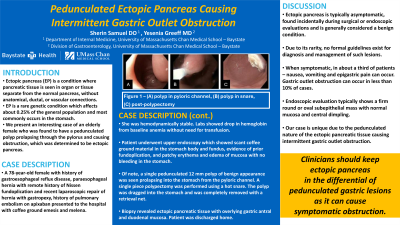Monday Poster Session
Category: Biliary/Pancreas
P1856 - Pedunculated Ectopic Pancreas Causing Intermittent Gastric Outlet Obstruction
Monday, October 28, 2024
10:30 AM - 4:00 PM ET
Location: Exhibit Hall E

Has Audio

Sherin Samuel, DO
University of Massachusetts Chan Medical School - Baystate
Springfield, MA
Presenting Author(s)
Sherin Samuel, DO, Yesenia Greeff, MD
University of Massachusetts Chan Medical School - Baystate, Springfield, MA
Introduction: Ectopic pancreas (EP) is a condition where pancreatic tissue is seen in organ or tissue separate from the normal pancreas, without anatomical, ductal, or vascular connections. EP is a rare genetic condition which affects about 0.25% of the general population and most commonly occurs in the stomach. We present an interesting case of an elderly female who was found to have a pedunculated polyp prolapsing through the pylorus and causing obstruction, which was determined to be ectopic pancreas.
Case Description/Methods: A 78-year-old female with history of gastroesophageal reflux disease, paraesophageal hernia with remote history of Nissen fundoplication and recent laparoscopic repair of hernia with gastropexy, history of pulmonary embolism on apixaban presented to the hospital with coffee ground emesis and melena. She was hemodynamically stable. Labs showed drop in hemoglobin from baseline anemia without need for transfusion. Patient underwent upper endoscopy which showed scant coffee ground material in the stomach body and fundus, evidence of prior fundoplication, and patchy erythema and edema of mucosa with no bleeding in the stomach. Of note, a single pedunculated 12 mm polyp of benign appearance was seen prolapsing into the stomach from the pyloric channel. A single piece polypectomy was performed using a hot snare. The polyp was dragged into the stomach and was completely removed with a retrieval net. Biopsy revealed ectopic pancreatic tissue with overlying gastric antral and duodenal mucosa. Patient was discharged home.
Discussion: Ectopic pancreas is typically asymptomatic, found incidentally during surgical or endoscopic evaluations and is generally considered a benign condition. Due to its rarity, no formal guidelines exist for diagnosis and management of such lesions. When symptomatic, in about a third of patients – nausea, vomiting and epigastric pain can occur. Gastric outlet obstruction can occur in less than 10% of cases. Endoscopic evaluation typically shows a firm round or oval subepithelial mass with normal mucosa and central dimpling. Our case is unique due to the pedunculated nature of the ectopic pancreatic tissue causing intermittent gastric outlet obstruction. Clinicians should keep ectopic pancreas in the differential of pedunculated gastric lesions as it can cause symptomatic obstruction.

Disclosures:
Sherin Samuel, DO, Yesenia Greeff, MD. P1856 - Pedunculated Ectopic Pancreas Causing Intermittent Gastric Outlet Obstruction, ACG 2024 Annual Scientific Meeting Abstracts. Philadelphia, PA: American College of Gastroenterology.
University of Massachusetts Chan Medical School - Baystate, Springfield, MA
Introduction: Ectopic pancreas (EP) is a condition where pancreatic tissue is seen in organ or tissue separate from the normal pancreas, without anatomical, ductal, or vascular connections. EP is a rare genetic condition which affects about 0.25% of the general population and most commonly occurs in the stomach. We present an interesting case of an elderly female who was found to have a pedunculated polyp prolapsing through the pylorus and causing obstruction, which was determined to be ectopic pancreas.
Case Description/Methods: A 78-year-old female with history of gastroesophageal reflux disease, paraesophageal hernia with remote history of Nissen fundoplication and recent laparoscopic repair of hernia with gastropexy, history of pulmonary embolism on apixaban presented to the hospital with coffee ground emesis and melena. She was hemodynamically stable. Labs showed drop in hemoglobin from baseline anemia without need for transfusion. Patient underwent upper endoscopy which showed scant coffee ground material in the stomach body and fundus, evidence of prior fundoplication, and patchy erythema and edema of mucosa with no bleeding in the stomach. Of note, a single pedunculated 12 mm polyp of benign appearance was seen prolapsing into the stomach from the pyloric channel. A single piece polypectomy was performed using a hot snare. The polyp was dragged into the stomach and was completely removed with a retrieval net. Biopsy revealed ectopic pancreatic tissue with overlying gastric antral and duodenal mucosa. Patient was discharged home.
Discussion: Ectopic pancreas is typically asymptomatic, found incidentally during surgical or endoscopic evaluations and is generally considered a benign condition. Due to its rarity, no formal guidelines exist for diagnosis and management of such lesions. When symptomatic, in about a third of patients – nausea, vomiting and epigastric pain can occur. Gastric outlet obstruction can occur in less than 10% of cases. Endoscopic evaluation typically shows a firm round or oval subepithelial mass with normal mucosa and central dimpling. Our case is unique due to the pedunculated nature of the ectopic pancreatic tissue causing intermittent gastric outlet obstruction. Clinicians should keep ectopic pancreas in the differential of pedunculated gastric lesions as it can cause symptomatic obstruction.

Figure: Figure 1 – (A) polyp in pyloric channel, (B) polyp in snare, (C) post-polypectomy
Disclosures:
Sherin Samuel indicated no relevant financial relationships.
Yesenia Greeff indicated no relevant financial relationships.
Sherin Samuel, DO, Yesenia Greeff, MD. P1856 - Pedunculated Ectopic Pancreas Causing Intermittent Gastric Outlet Obstruction, ACG 2024 Annual Scientific Meeting Abstracts. Philadelphia, PA: American College of Gastroenterology.

